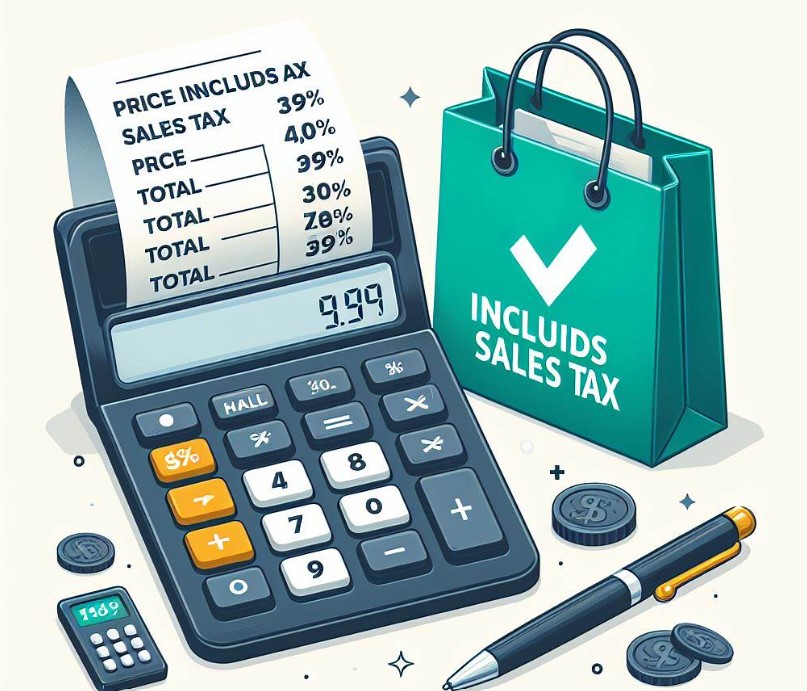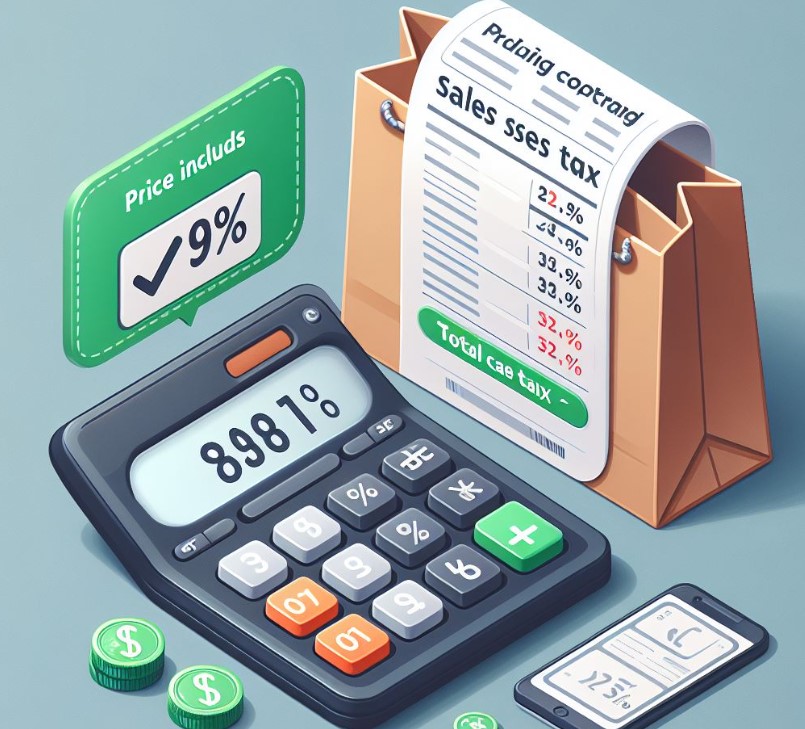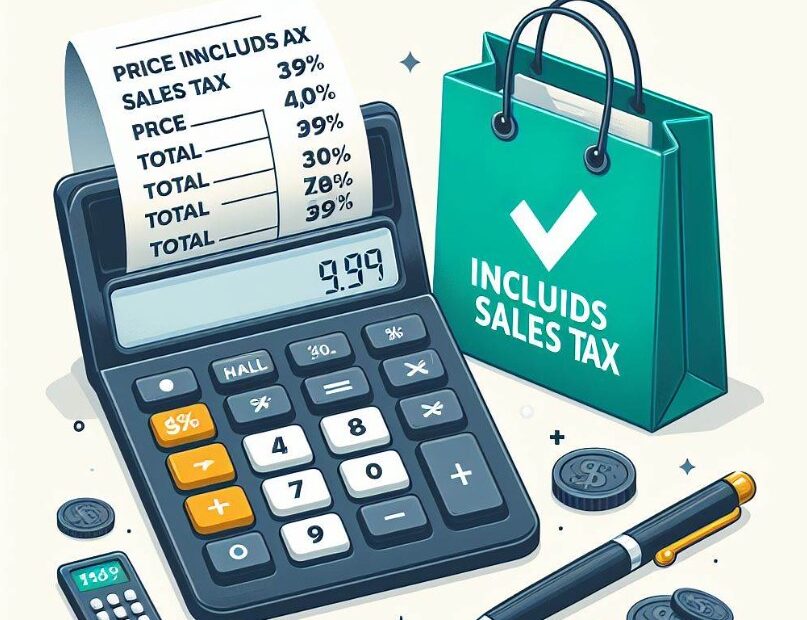In today’s competitive market, understanding pricing strategies is crucial. A common query among businesses and consumers alike is, Can I Include Sales Tax In My Price? This article delves into this critical question, offering insights and guidance.
Key Takeaways
- Inclusivity of Sales Tax: Understanding regulations and consumer preferences.
- Transparency in Pricing: Impact on customer trust and legal compliance.
- Regional Variations: Adhering to different state and country laws.
- Business Implications: Effects on pricing strategies and competitiveness.
- Ethical Considerations: Balancing legality and customer perception.
Can I Include Sales Tax In My Price?
Yes, you can include sales tax in your price. However, whether you should depends on the legal requirements and consumer preferences in your specific region.

In some areas, including sales tax in the listed price is standard practice, while in others, it is added at the point of sale. It’s important to understand and comply with local tax laws and consider how your pricing strategy affects customer perception and trust.
Inclusivity of Sales Tax
Legal Considerations
In many jurisdictions, the law mandates how sales tax should be displayed in pricing. For instance, in the European Union, the Value Added Tax (VAT) is typically included in the displayed price.
In contrast, the United States often requires that sales tax be added at the point of sale, not at the listed price. Understanding these legal nuances is crucial for businesses to avoid penalties.
Consumer Preferences
Consumers’ expectations vary by region. In countries where tax-inclusive pricing is standard, consumers might find tax-exclusive pricing misleading. Conversely, in regions where adding tax at the point of sale is customary, inclusive pricing might confuse customers. Adapting to local consumer preferences is key to maintaining trust and satisfaction.
Transparency in Pricing
Building Trust with Customers
Transparency in pricing, including how sales tax is applied, builds trust with customers. Clear communication about pricing helps avoid surprises at checkout, leading to better customer experiences and loyalty.
Legal Compliance
Adhering to regional laws regarding sales tax and pricing is not only a legal requirement but also a part of ethical business practices. Non-compliance can result in fines, legal action, and damage to a business’s reputation.
Regional Variations
Each country, and sometimes each state within a country, has its regulations regarding sales tax inclusion in pricing. For instance, in the United States, sales tax rates and laws vary significantly from state to state. Businesses operating in multiple regions need to be acutely aware of these differences to ensure compliance.

Business Implications
Impact on Pricing Strategies
Whether to include sales tax in the price can affect a business’s overall pricing strategy. It influences how prices are perceived by the customer and can impact competitiveness in the market.
Competitive Edge
Businesses that successfully navigate the complexities of tax-inclusive or exclusive pricing can gain a competitive edge. By aligning their pricing strategy with legal requirements and customer preferences, businesses can enhance customer satisfaction and loyalty.
Ethical Considerations
While legality is a primary concern, the ethical implications of how sales tax is presented in pricing should not be overlooked. Businesses have a responsibility to present pricing information in a manner that is not misleading or deceptive to consumers.
Evaluating the Impact on Online Sales

E-Commerce Considerations
In the digital marketplace, the question of including sales tax becomes even more complex. Online businesses often serve a global customer base, requiring an understanding of diverse tax laws. Platforms must be equipped to display prices correctly based on the customer’s location, incorporating local tax rates where applicable.
Dynamic Pricing Strategies
To effectively manage sales tax in online pricing, businesses may adopt dynamic pricing strategies. These strategies automatically adjust the final price based on the customer’s location, ensuring compliance with local tax laws and reducing the risk of cart abandonment due to unexpected costs at checkout.
Accounting and Financial Reporting
Accurate Record-Keeping
Including sales tax in the price requires meticulous accounting practices. Businesses must accurately track the amount of sales tax collected and remitted. This precision in financial reporting is vital for compliance with tax authorities and for maintaining clear financial records.
Tax Audits and Compliance
Businesses must be prepared for tax audits, which can scrutinize the accuracy of sales tax collection and reporting. Proper documentation and adherence to tax laws are essential to pass these audits without penalties or legal repercussions.
Marketing and Customer Perception
Pricing Psychology
How sales tax is included in pricing can influence customer perception and buying behavior. Psychologically, customers might perceive a product as more affordable if the price is tax-inclusive, as it presents a clear, final cost. This strategy can be particularly effective in price-sensitive markets.
Marketing Transparency
Transparent pricing, including clear indications of tax inclusion or exclusion, can be a strong marketing tool. It fosters trust and can be leveraged in promotional materials to emphasize the business’s commitment to honest and straightforward dealings.
Adapting to Changing Tax Laws

Staying Informed
Tax laws are subject to change, and businesses must stay informed to remain compliant. This includes understanding not only the rates but also how taxes should be presented in pricing. Keeping abreast of legislative changes is crucial for long-term operational stability.
Flexibility in Business Models
Businesses should develop flexible pricing models that can quickly adapt to changes in tax laws. This agility allows them to maintain compliance and operational efficiency, even in the face of evolving tax regulations.
Global Perspectives on Sales Tax Inclusion
Cultural and Regional Differences
The approach to including sales tax varies widely across different cultures and regions. Understanding these differences is crucial for businesses operating internationally. In some regions, tax-inclusive pricing is the norm and expected by consumers, while in others, it may be unusual or even frowned upon.
Global Business Strategies
For businesses operating on a global scale, developing a nuanced understanding of each market’s tax practices is key. This might involve tailoring pricing strategies to align with local customs and expectations, thereby enhancing the customer experience and ensuring regulatory compliance.
Conclusion
In conclusion, the decision to include sales tax in the price is multifaceted, involving legal, ethical, and business considerations. Businesses must judiciously evaluate their approach to displaying sales tax, ensuring compliance with regional laws and alignment with customer expectations. Ultimately, a transparent and well-considered approach to pricing can bolster customer trust and contribute to a business’s long-term success.
Top FAQ’s
Does sales tax inclusion influence customer buying behavior?
Yes, it can affect the perception of value and affordability, influencing customer decisions, especially in markets sensitive to price clarity.
How important is compliance with tax laws in pricing?
Compliance is crucial to avoid legal repercussions, maintain a good business reputation, and ensure accurate financial reporting.
What challenges do online businesses face with sales tax inclusion?
Online businesses must navigate varying tax laws across different jurisdictions, requiring dynamic pricing systems that adjust prices based on the customer’s location.
Can sales tax inclusion impact a business’s competitive edge?
Yes, businesses that effectively manage sales tax inclusion in their pricing can differentiate themselves in the market, particularly if they operate in regions where this practice aligns with consumer expectations.

Muhammad Talha Naeem is a seasoned finance professional with a wealth of practical experience in various niches of the financial world. With a career spanning over a decade, Talha has consistently demonstrated his expertise in navigating the complexities of finance, making him a trusted and reliable figure in the industry.









